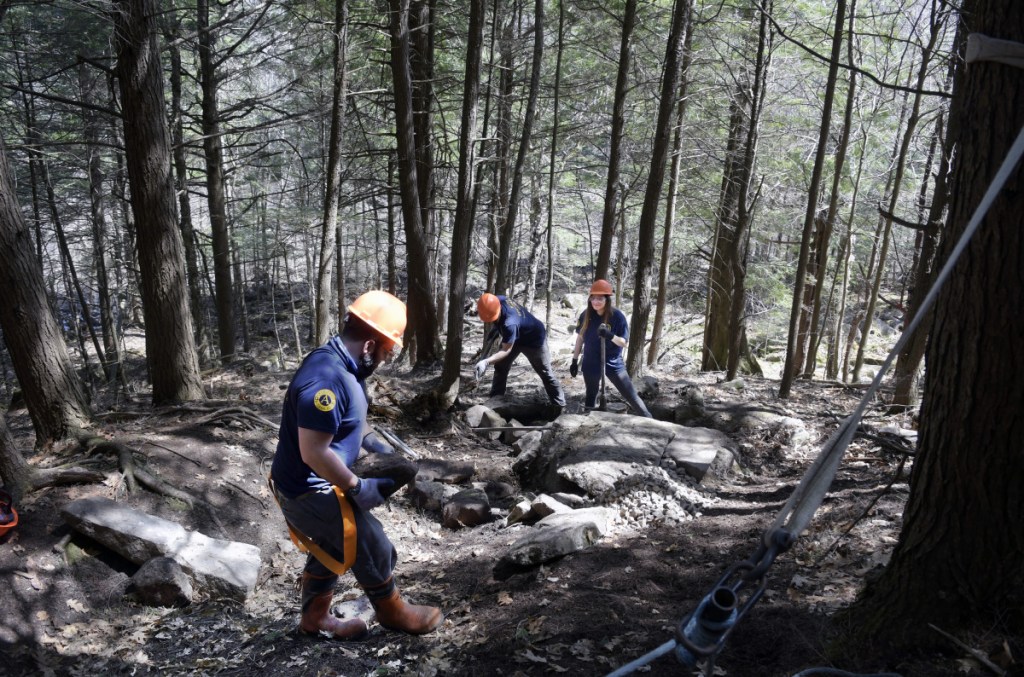AUGUSTA — You’ve got to break a few rocks to make a staircase in the middle of the woods.
Not to mention dig them up, move them across hilly terrain and set them in place.
It’s no easy task when some of the granite rocks used by Maine Conservation Corps and Americorps members to build staircases at the Augusta Nature Education Center weigh four times what a person does.
That’s why corps members and team leaders spent this week training at the 175-acre nature center, which is free and open to the public.
The members have been learning how to move rocks down precipitous hills using a high-line winch system, place them carefully, and create crushed rock to fill in around the larger rocks.
Smashing a large granite rock that had been dug up from the moist ground with a hammer, Rachel Herr, 25, of New York, broke the rock into smaller pieces to be used in a stone staircase her fellow workers had begun nearby.
“Doing rock work, you’ve got to use your mind. It’s like a puzzle, putting it together,” Herr said. “And, of course, it’s physically demanding.”
The group of about a dozen corps members camped out close to their work site. Though the site is near the center of the city, tucked in among South Belfast Avenue, the Capital Area Technical Center and Cony Street, they trained as if they were in the backcountry, since that’s where most of the team leaders will end up taking trail crews across the state once training is complete.
So their training, which also included sessions at Camp Cobbossee in Monmouth, featured topics such as wilderness first responder training, first aid in both physical and mental health, and safety.
WORK THAT LASTS
They also want their work to endure, as has an existing staircase built in the nature center several years ago by other corps workers.
“Most of us are out here, not just to be outdoors and be able to see the state, but also to create something that is going to last,” said Louis Chiappetta of Readfield, a team leader for the Maine Conservation Corps. “Something you can feel good about creating, out in nature.”
Creating trails and building staircases in the woods does involve some destruction before the trails can be built back up. Rocks are dug up, disturbing soil. Trees are used to create water bars that divert water from trails to prevent erosion.
But the workers follow a “leave no trace” ethos, so their work sites when they’re done are in a condition close to their natural state, while still creating a trail that others will use to access wooded territory.
“Our goal is to leave the place more inviting, more accessible, but still in as natural a state as possible,” Chiappetta said. “A very well-built water bar, and its impact preventing erosion, can last decades. The whole point of building the stairs is the rest of the hill doesn’t get eroded.”
Jackie McNeill, president of the Augusta Nature Club, which owns much of the land that makes up the education center, said the club greatly appreciates the work corps members do as they train.
“They do a wonderful job, and they’re great people,” said McNeill, who with other club members, helped on the trails this week. “Everything they do enhances the nature center.”
Other features at the nature center include a bridge built by a local Eagle Scout.
No power tools are used. The trail workers use steel rock bars, ropes, winches, pulleys, hammers and their own strength and wits to manipulate and place rocks in staircases.
PLENTY OF ROCKS
And they use plenty of rocks. Chiappetta and McNeill noted the nature center land is not short of rocks, as the area previously was used as a granite quarry.
The ideal rock for building a staircase, Chiappetta said, is something with a fairly flat surface but with some texture, for tread grip, longer than a boot and wide enough to stand on, with parallel sides and at least 8 inches tall, so it has enough rise.
Americorps, a program of the federal Bureau of Parks and Lands, is funded by the Corporation for National and Community Services, the Maine Commission for Community Service, and grants and sponsoring organizations.
Workers receive educational funding they can use to pay student loans, take classes and generally further their educations.
Keith Edwards can be contacted at 621-5647 or at:
kedwards@centralmaine.com
Twitter: kedwardskj
Send questions/comments to the editors.




Success. Please wait for the page to reload. If the page does not reload within 5 seconds, please refresh the page.
Enter your email and password to access comments.
Hi, to comment on stories you must . This profile is in addition to your subscription and website login.
Already have a commenting profile? .
Invalid username/password.
Please check your email to confirm and complete your registration.
Only subscribers are eligible to post comments. Please subscribe or login first for digital access. Here’s why.
Use the form below to reset your password. When you've submitted your account email, we will send an email with a reset code.